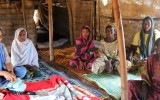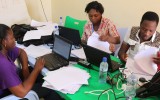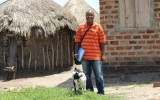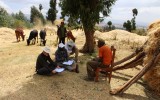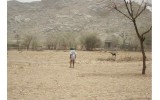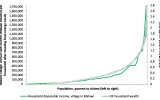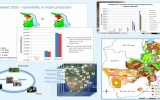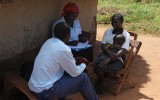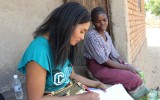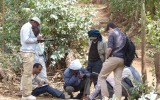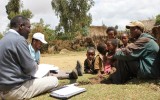Blog
Showing items 16 to 28 of 28
View Categories
- Areas of expertise
- Capacity building
- Climate change
- Data
- Disasters and emergencies
- Famine prevention and food security
- Gender
- Income diversification
- Inequality
- Lake Victoria fisheries
- Livelihood resilience
- Livelihood Zones
- Livelihoods
- Monitoring and evaluation
- Nutrition and health
- Open source
- Policy and programme design
- Post-conflict
- Poverty research
- Refugees and displacement
- Social protection
- Technology
- Urban
- Vulnerability assessment
- Countries
- Hydromet
- Methods
- Resilience
- The organisation
-
Refugees’ livelihoods are important
Almost 15 years after the UN General Assembly proclaimed 18 December to be International Migrants Day (IMD), how has the occasion been received and observed, whose rights does it champion, and which groups does it currently exclude? Migrants and refugees: what’s the difference? In December 2000, two global days of observance related to migration were […]
-
Mobile data, measurement & evidence… what’s new?
As mobile data collection in remote regions and developing countries becomes more viable for development organisations, the robustness of the methodologies used must be considered in relation to the goal of evidence-based development. Expanded possibilities According to the UN International Telecommunication Union, “by the end of 2014, 55% of all mobile-broadband subscriptions are expected to […]
-
Oiling the relationship between evidence and policy: prioritising data quality and integrity
LSE’s recent JSRP conference on politics and evidence in international development highlighted problems inherent in the ways ‘evidence’ tends to be defined and used in mainstream development discourse and practice. How can Evidence for Development’s individual household method (IHM) and current involvement in the ‘Assessing Rural Transformations’ project inform the discussion and help to oil […]
-
Maternal healthcare in the post-MDGs era: outputs are not always outcomes
The current Millennium Development Goals are coming to an end in 2015 and a new framework is being developed. Have the previous goals relating to improving maternal health actually been achieved, and are the reported improvements being experienced by individuals on the ground? Or does the new framework perhaps need a different focus when it […]
-
Aid impact assessment and agricultural change: Researching ‘good enough’ qualitative approaches
Using public money to reduce global poverty is a tough enough ‘task’ even without having to account for each pound spent every five minutes. But aid professionals can hardly claim to be less susceptible to self-serving group-think than anyone else, and indeed the case for strong reality checks on aid expenditure will remain particularly strong […]
-
When evidence isn’t clear
Practical and reliable estimates of wealth and poverty are becoming increasingly important as more countries introduce social protection systems, and as development programmes place a greater emphasis on targeting. However, there is not yet a widely-accepted ‘gold standard’ measuring method – and in the absence of this, it is difficult to assess the relative merits of […]
-
Climate change mitigation needs to be based on good information
As the international community grapples with the problem of climate change and its impact on agriculture, food security and poverty alleviation, the economic consequences for smallholder farmers need to be better understood and documented. Unless we are able to analyse and predict more precisely the ways in which both climate change and assistance programmes will […]
-
For richer, for poorer… inequality curves now look similar in the UK and rural Africa
Idly scanning the pages of the Observer on Sunday morning, this graphic caught my eye in Will Hutton’s article about inequality in Britain. Evidence for Development has a large collection of individual household income data from some of the poorest countries in Africa, and Hutton’s chart on wealth inequality in the UK reminded me […]
-
Big data, climate change and developing economies: predictive modeling for improved lives
I did my first, and possibly last, Ignite talk at Strata London recently. If you don’t know the format it goes like this: 5 minutes, 20 slides; the slides automatically advance every 15 seconds and you have to tell your story and finish on time. The story I was telling wasn’t about Acunu, nor even […]
-
Helping to rebuild communities in northern Uganda
You might remember all the attention last year on stopping Joseph Kony and the LRA. For the past two weeks I’ve been with Self Help Africa (SHA) in a region of northern Uganda that was severely affected by the conflict – in many villages, a whole generation of young adults are missing – and there […]
-
Evidence for Development’s BIG GIVE Christmas Challenge!
Very exciting news! Evidence for Development have been nominated by the Reed Foundation to take part in this year’s Big Give. This means that any donation you make to EfD between Thursday 5th – Saturday 7th December should be DOUBLED! EfD aims to raise enough money to fund two promising students to study on key Master’s courses in Uganda, helping to build local expertise to fight poverty […]
-
The Evidence for Development blog – a quick introduction
All of us at Evidence for Development are delighted to be launching our new website (generously designed pro bono by an anonymous-for-the-moment friend), complete with a section for blog posts. We’ll use these blogs to share EfD news and insights, start new development debates or add our own perspectives to existing ones. We’re hoping to […]
-
Introducing (or reintroducing) Evidence for Development
“What’s the problem?” I can hear people ask. “Why do we need another organisation doing research into poverty?” The fact is that there is a serious lack of accurate evidence about how very poor people choose to use their limited resources to survive. And without this information, it is not easy to see how aid […]
